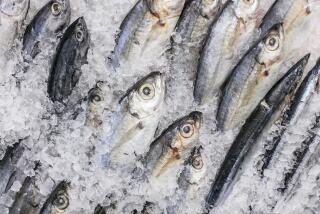FDA advisors urge more study of genetically altered salmon
- Share via
Reporting from Washington — A Food and Drug Administration advisory panel debated Monday whether to endorse the safety of genetically engineered salmon, but instead urged the agency to require more studies to demonstrate the fish’s safety.
The North Atlantic salmon developed by AquaBounty Technologies Inc. of Waltham, Mass., would be the country’s first genetically engineered food animal.
The Veterinary Medicine Advisory Committee did not vote on the FDA’s preliminary findings that the fish was safe for people to eat and did not pose a significant environmental risk. Instead, the panel offered a series of recommendations aimed at fleshing out information, including the possibility that the fish could trigger allergies or other health problems in some consumers.
The panel’s chairman, David Senior of Louisiana State University, said he thought members generally believed the fish was safe to eat, but were concerned that some studies had a small sample size.
One panelist, Greg Jaffe of the nonprofit Center for Science in the Public Interest, predicted after the meeting that the FDA would eventually approve the salmon, “but I don’t think the agency’s going to go quickly on this.”
The salmon is produced by taking a portion of the gene that protects the ocean pout fish against freezing, transplanting it into the growth gene of a Chinook salmon and transferring the blended genetic material into the fertilized eggs of a North Atlantic salmon.
The resulting fish grows during the winter months as well as the summer, unlike an ordinary salmon.
Several panelists raised concerns about the fast-growing fish, saying there were not enough data to answer key questions about allergens and other potential risks.
“There are questions that have not been answered by the data that has been presented,” said panelist James McKean, a veterinarian and professor at Iowa State University.
But other panelists argued there was no difference between the altered salmon and its natural counterpart.
“I would not feel alarmed about eating this kind of fish,” said Gary Thorgaard, a professor and fish researcher at Washington State University.
The panel’s conclusions are not binding, but the FDA usually heeds its recommendations.
The hearings continue Tuesday, when the FDA will hear testimony about what labeling, if any, should be required if the salmon was approved.
azajac@latimes.com
Reuters contributed to this report.






